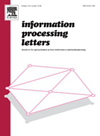Information Processing & Management is devoted to refereed reporting of: 1. Basic and applied research in information science, computer science, cognitive science and related areas that deals with: the generation, representation, organization, storage, retrieval, and use of information; the nature, manifestations, behavior, and effects of information and knowledge; communication and distribution of information and knowledge; and human information behavior. 2. Experimental and advanced processes related to: information retrieval (IR); digital libraries; knowledge organization and distribution; digitized contents - text, image, sound and multimedia processing; and human-computer interfaces in information systems. Implementations in information retrieval systems and a variety of information systems, networks, and contexts. Related evaluation. 3. Management of information resources, services, systems and networks, and digital libraries. Related studies of the economics of information and the principles of information management. The aim is to provide an international forum for advanced works and critical analysis in these interdependent and interdisciplinary areas. Invited are original papers and critical reviews of trends reporting on: Progress in the theory, principles, and procedures in information processing, particularly involving information retrieval; search engines; knowledge and distributed intelligence; information representation, classification, extraction, filtering and summarization; question answering; information navigation, browsing and visualization; and human-computer interaction in information systems. Research on the formal characteristics and properties of information and knowledge and the associated processes of communication among humans and between humans and machines. Includes studies of human information needs, seeking, searching, and use; and bibliometric and infometric studies of the structural and statistical properties of information artifacts. Modeling and evaluation of information systems performance, particularly of information retrieval systems, knowledge systems, and digital libraries. Studies of their effectiveness, efficiency, value, or impact. Studies in management and economics of information and information systems. Use of information for decision making and problem solving. Studies in information policies. Data and issues relevant to information policies on organizational, national, and international levels. Derivation and use of information indicators.
